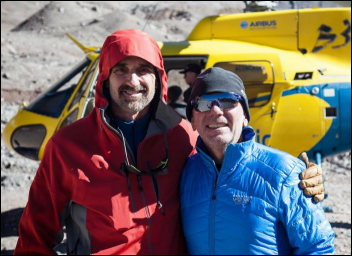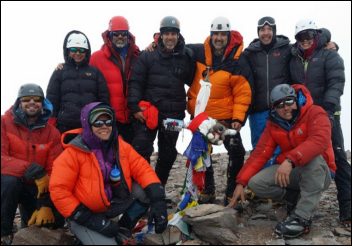CIO Unplugged 8/17/16
The views and opinions expressed are mine personally and are not necessarily representative of current or former employers.
Re-Igniting Passion
For the past year, I have had the privilege of serving the City of New York. During the week, I live in lower Manhattan in the heart of the financial district. Each morning, my 15-minute walk to the office takes me down Wall and Broad Streets.
As I pass Federal Hall and head toward the New York Stock Exchange, crowds of tourists scramble across the brick-floored plaza to take selfies and purchase concessions. Sometimes I get aggravated as I navigate through the crowd, but soon my grimace turns to a smile.
It’s easy to determine tourist from businessperson, and it’s not always the clothes. The tourists are excited and have a sense of wonderment on their faces. Their eyes are wide as they view the Exchange and the nearby Statue of Liberty for the first time.
For me and other locals, the sights are routine. We’ve long since lost the feeling of awe and passion we initially possessed when we were new to the sights. It made me ask myself, how do we maintain that initial passion in all we do, especially in relationships and work?
We are all uniquely wired and there is no single answer. Some people are chronically unhappy and passion has long withered. Some require a consistent encouraging word or gentle reminder. Others benefit from education and understanding themselves so they can discover and actualize their fire. Some benefit from embracing vision. I fall into the gentle reminder camp.
As leaders, I believe our energy is best served encouraging passion in those who show capacity and interest. We should seek to inspire, not motivate. At the end of the day, most of us want to be able to look forward to getting up and going to work. We covet those expressions of awe and wonderment as if it were our first day discovering a new city or kindling a new relationship. A couple of ideas:
- Office in a patient care setting. Over the last few years, I ended up with a corporate office far away from patient care settings. Now, I have to be intentional about getting back out there so I can connect with patients and clinicians.
- Answer the question– why healthcare? You can practice IT in any industry. Why did you choose healthcare? If it is altruistic, write it on your heart. You will need to re-center there often.
- Figure out your mission and write it down. I have written about this more than once because it’s a message that deserves repeating. It’s not so much the written words you end up with, but the deep introspection required to better understand yourself.
- Accountability. Find a friend or partner who will remind you now and again to find that smile and confidence that comes from having a sense of purpose. They can remind you to act like those wide-eyed tourists and be joyful for your opportunity.
- Thankfulness. I really think there is a correlation between active thankfulness and personal and professional fulfillment. If you can’t find anything to be thankful for, then you will never be fulfilled. If thankfulness is hard, then simply practice it and the attitude will follow. I am even thankful for the hard stuff I have been through.
- Calling. This is similar to mission, but with a spiritual bent for those so inclined. I feel strongly that I know my identity and that my sense of purpose has been revealed to me through reading scripture, meditation, discourse, and prayer. I believe there is a calling for everyone, but it is up to each of us to seek and find.
- Humility. If you can’t admit you need help with keeping passion alive, then you probably have a pride issue—and pride will kill passion time and again. Pride is a temporary salve for pain you carry and it’s a vicious cycle from which it is hard to escape.
Having passion does not guarantee success or that you are immune from the trauma of life. My passion has served me well over the years, but it has not sheltered me from harm, lapses of judgment, or damage. However, I think it goes a long long way toward a satisfying career and a meaningful life.
How do you keep passion lit in your career?

Ed encourages your interaction by clicking the comments link below. You can also connect with Ed directly on LinkedIn and Facebook and follow him on Twitter.









Hopefully it's not through MyChart, but I've definitely heard of Secure Chat (Epic's internal messaging system within Hyperspace and Haiku)…